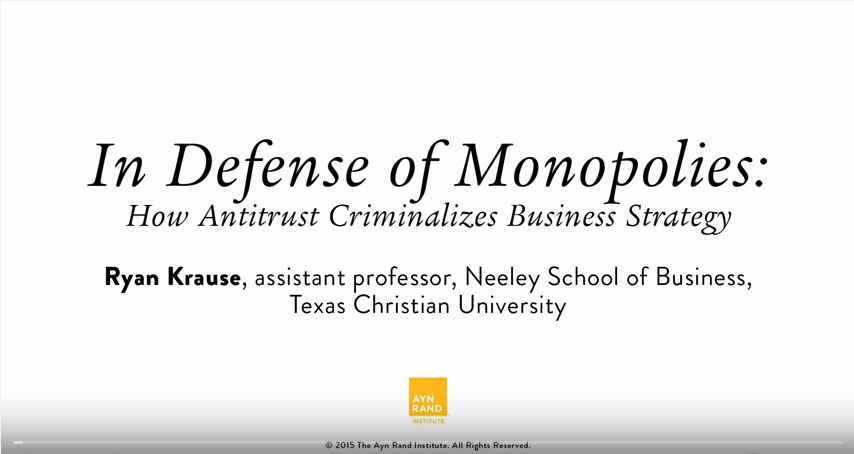Ayn Rand often referred to antitrust as among the most immoral of laws and in this video from OCON 2015, Associate Professor of Strategy Ryan Krause discusses how antitrust laws destroy a businessman’s ability to plan for the long range success of his company by their effect on business strategy. He defines business strategy and summarizes the impact of antitrust laws in this quote:
Business strategy is the crux of high-level business decision making. Its what business should we be in, what groups of businesses should we incorporate together. So it is very fundamental. Pretty much any decision you make in business strategy is going to run afoul of antitrust.
Or, as he tells his students at the start of the semester:
Welcome to class. Everything I am going to teach you over this semester is illegal. Click To TweetPhilosophical View of Antitrust
Because he was giving the talk at the Objectivist Summer conference, Ryan Krause didn’t go into the philosophical view of this issue that Ayn Rand and other Objectivist authors have covered. He referes to two key essays from Capitalism: The Unknown Ideal:
“America’s Persecuted Minority: Big Business” and “Antitrust”
There is a tremendous amount of interesting information in this one hour talk such as: why the perfect competition model is the enemy of strategy, how the way economists (and I would add regulators) view competition is similar to how inequality critics view income and wealth, how the effects of antitrust laws change business behavior (great example from Family Dollar, Dollar General merger), how antitrust laws are now simply accepted as good by definition, how there can be many monopolies competing more or less amicably, and more.
I found particularly interesting the business strategist’s definition of what a monopoly is, which is both broader and narrower than the standard. As Krause describes it, business strategy is about creating a market where you have a monopoly and then growing that market, competing at the margin, where your market overlaps with another company’s. For example, when Apple created the iPhone, they didn’t have (and still do not) a monopoly on cell phones (or smart phones now), but they did create (and still maintain) a monopoly on the iPhone, and their success has largely come from expanding that monopoly (i.e. getting more people to feel that they have to have an iPhone as against a flip phone.)
In other words, you find a way to make your product or service unique, a way that provides additional value for your customer, and you compete on the basis of that rather than simply on price. Once you are reduced to competing only on price, things become very difficult as there is nothing to really distinguish you from your competitors. (Krause noted that the airline industry is one that has been hit hard by pure price competition and that is why all the frills and amenities are going away, because customers are just looking at price.)
It is especially intriguing that this definition of monopoly is also what the regulators use to rein in successful companies. As Krause puts it, “Its that [anti-trust officials are] going to define this market as narrowly as they have to to make sure you are the only one in it.” And then threaten you with an antitrust suit. The example he gives in the talk is Whole Foods, which created a market for itself by focusing on organic and natural foods, and became successful. However, when they attempted to buy up another store chain, the regulators halted the merger because they claimed that this would create a monopoly in that market, even though other companies such as Target and Wal-Mart also sell organic and natural foods.
So we are left with the fact that the very things you must do to have a successful business is the very things that antitrust regulators will come after you for. Krause describes his students’ reactions when they realize this:
Students will come up to me and say, “Why did you teach us all this stuff? Its all illegal and we can’t do any of it.” Well, just don’t get too successful and they probably won’t bother you.
The main talk is about 41 minutes followed by 16 minutes of Q&A

